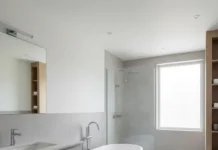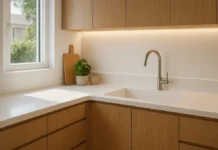If you’re considering a kitchen makeover, the choice of countertop can significantly impact both aesthetics and functionality. Have you thought about Corian solid surface worktops? These surfaces have remained a favorite for homeowners for years, and it’s easy to see why. Corian not only boasts a sleek, seamless design but also offers practical advantages that can simplify your daily kitchen tasks. In this article, we’ll explore the unique characteristics of Corian, what to consider before making a purchase, and the benefits of integrating it into your kitchen design.
###
Discovering the Unique Features of Corian
Corian is a solid surface material made by combining natural minerals with acrylic resin. Developed by DuPont, it provides a refined look without the high maintenance that comes with materials like granite or quartz. Why is it so popular? Here are some standout features:
Unlike laminate, which can chip or peel, Corian is solid throughout. Plus, any scratches that appear can often be sanded away, keeping your countertop looking pristine.
###
Key Considerations Before You Purchase Corian
When choosing Corian, variety is at your fingertips, but narrowing it down requires some thought. Here are essential factors to keep in mind:
####
Color and Finish Choices
Corian comes in a wide array of colors and patterns, ranging from soft whites to rich, dark tones. Some finishes feature a subtle texture, while others are sleek and glossy.
– For a modern aesthetic, consider fresh whites or cool grays.
– If you prefer a warm, rustic vibe, shades like linen or sand pair beautifully with wooden cabinets.
Neutral tones often provide the best long-term flexibility, especially if you’re planning future kitchen updates.
####
Thickness and Edge Design
Corian countertops typically come in various thicknesses: ½ inch, ¾ inch, and 1¼ inch. Thinner options lend a contemporary floating effect, while thicker styles evoke a more traditional feel.
The edge design can range from simple square cuts to more intricate rounded or beveled styles. These details can significantly influence your kitchen’s overall appearance, especially in open spaces.
###
Incorporating Functional Design Features
One of the most appealing aspects of Corian is its adaptability to various design needs. Whether you’re working with a designer or tackling a DIY project, the possibilities are extensive.
####
Integrated Sinks
You can mold sinks from the same Corian material, ensuring a smooth transition from countertop to basin. This design not only enhances aesthetics but also simplifies cleaning. Fewer seams mean less grime buildup, which is a major plus for hygiene.
####
Backsplashes and Wall Treatments
Corian serves excellently as a backsplash, especially when it matches the countertop. Running a single sheet up the wall creates a unified look. Additionally, its ability to curve at corners softens edges and promotes a seamless appearance, making it easier to maintain than traditional tiles.
###
Everyday Life with Corian
If you’re an avid cook or simply want a low-maintenance kitchen, Corian is designed for easy living.
####
Maintenance and Cleaning
Daily upkeep is straightforward—just warm soapy water and a cloth will do the trick. Since it’s non-porous, you won’t have to worry about stains or bacteria lurking on the surface.
####
Heat Resistance and Durability
While Corian is durable, it’s not entirely heatproof. To protect your countertop, always use trivets or mats under hot cookware. It can scratch if you cut directly on it, but most marks can be easily polished out. Over time, if the surface dulls, refinishing can restore its original shine.
###
Understanding Costs and Long-Term Value
Corian countertops are positioned between laminate and high-end quartz in terms of price. While they aren’t the cheapest option, they provide excellent long-term value, particularly for those seeking a built-in look that remains clean and stylish.
Pricing factors include:
Obtaining quotes can help you understand what’s available, and some companies might offer sample packs or visualizer tools to assist in your decision-making.
###
Common Questions About Corian
Can I place hot pans directly on Corian?
No, it’s advisable to use a trivet or pad to prevent damage.
Is Corian considered outdated in 2025?
Not at all! Corian continues to evolve with new colors and styles, maintaining its popularity in contemporary kitchens.
What is the typical cost of Corian countertops?
Prices vary, but expect to pay in the mid-range between laminate and premium quartz or granite based on your customization choices.
What materials are used to create Corian?
It consists of natural minerals and acrylic resin, giving it that smooth, solid feel.
###
Final Thoughts on Choosing Corian for Your Kitchen
If you envision a sleek, easy-to-maintain countertop that fits seamlessly into your kitchen design, Corian might be the perfect choice for you. With its impressive design flexibility, durability, and low-maintenance nature, it can elevate your kitchen space. Take your time to explore different colors and thicknesses, and consult with your installer about adding features like sinks and backsplashes. Whether you’re undertaking a major renovation or simply refreshing your kitchen, Corian can help create a clean, cohesive look.




















